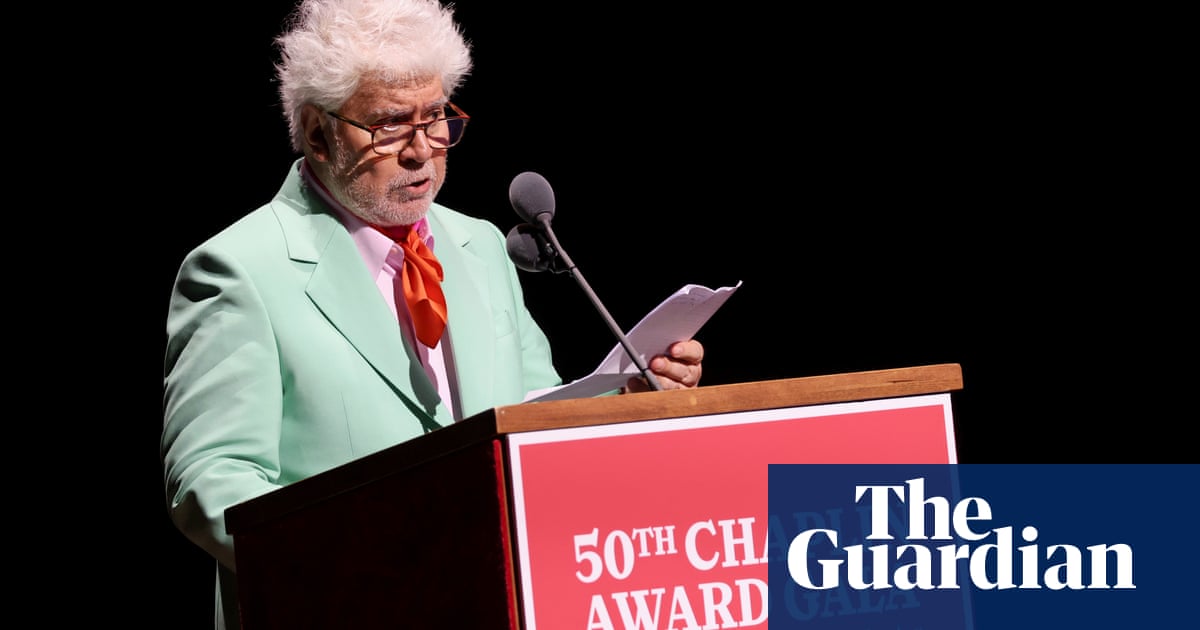He has blinged it with gold cherubim, gold eagles, gold medallions, gold figurines and gilded rococo mirrors. He has crammed its walls with gold-framed paintings of great men from US history. In 100 days Donald Trump has turned the Oval Office into a gilded cage.
The portraits of Andrew Jackson, Ronald Reagan and other past presidents gaze down from a past that the 47th seems determined to erase. Trump is seeking to remake the US in his image at frightening speed. The shock and awe of his second term has challenged many Americans’ understanding of who they are.
In three months Trump has shoved the world’s oldest continuous democracy towards authoritarianism at a pace that tyrants overseas would envy. He has used executive power to take aim at Congress, the law, the media, culture and public health. Still aggrieved by his 2020 election defeat and 2024 criminal conviction, his regime of retribution has targeted perceived enemies and proved that no grudge is too small.
Historically such strongmen have offered the populace a grand bargain: if they will surrender some liberties, he will make the trains run on time. But Trump’s delusions of monarchy have been coupled with a fundamental ineptitude.
His trade war injected chaos into the economy, undermining a campaign promise to lower prices and raising the spectre of recession; his ally Elon Musk wreaked havoc on the federal government, threatening health and welfare benefits for millions; his foreign policy turned the world upside down, making friends of adversaries and turning allies into foes.
Having promised so much winning, Trump is losing. Just 39% of respondents approve of how he is handling his job as president, according to an opinion poll by ABC News, the Washington Post newspaper and Ipsos, while 55% disapprove. For the first time Trump is even under water on his signature issue of immigration.
“Donald Trump’s first 100 days as president have been 100 days from hell for the American people,” Chuck Schumer, the minority leader, wrote in a letter to Senate colleagues. “His first 100 days have been the worst for any president in modern history, and unsurprisingly, he has the lowest 100-day job approval any president has seen in 80 years.”
The scale of the disaster is hard to comprehend for anyone who expected a repeat of Trump’s first term. His first 100 days in 2017 were consequential enough: a travel ban on seven Muslim-majority countries, an order for construction of a wall along the US-Mexico border and the firing of his national security adviser, Michael Flynn, over undisclosed contacts with Russia. But while America’s guardrails bent, they did not break.

From the moment he was sworn in on 20 January 2025, with the tech oligarchs Musk, Jeff Bezos and Mark Zuckerberg looking on, it was clear that Trump’s second presidency would be of a different magnitude. Instead of the conservative stalwart Mike Pence as vice-president, there is the Maga isolationist JD Vance. Instead of the retired four-star general Jim Mattis as defence secretary, there is the former Fox News weekend host Pete Hegseth.
And instead of experienced hands ready to curb Trump’s impulses, there is a cabinet of sycophants eager to indulge them, including in ostentatious displays for the TV cameras. Trump, 78, told the Atlantic magazine: “The first time, I had two things to do – run the country and survive; I had all these crooked guys. And the second time, I run the country and the world.”
Leon Panetta, a former defence secretary and White House chief of staff, said: “In the first term there were some guardrails and individuals that were able to restrain him before he took action. In the second term he doesn’t have any guardrails and deliberately selected a cabinet in which loyalty was the primary quality that he was after.
“The problem is that he goes ahead and takes actions that can cause tremendous disruption. The only check that I can see is when something he does could very well lead to an economic disaster of one kind or another. It’s only when that seems clear that he basically pulls back.”
Trump and his allies had four years in political exile to plot and plan a disruptive agenda laid out in Project 2025, a set of proposals by the rightwing Heritage Foundation thinktank in Washington. Yet its execution has been undermined by the president’s mercurial nature, cabinet infighting and leaks, especially at the Pentagon, reportedly now in disarray.
Charlie Sykes, a conservative author and broadcaster, said: “I’m struck by this weird combination of a focused and very well-planned agenda on the one hand and reckless incompetence on the other. You have Russ Vought [director of the office of management and budget] and the Project 2025 folks who clearly had a blueprint for action ready to go and yet you also see this pattern of dysfunction running through agencies like the Department of Justice and Department of Defense.”
For Trump’s diehard supporters, his key strength is his success as a businessman and promise to run the economy accordingly. As president he has imposed tariffs on trading partners including Mexico, Canada and China, with Chinese goods facing a combined tax of 145%.
The impact has been profound, with consumer confidence plummeting, stock markets convulsing and investors losing confidence in the credibility of Trump’s policies. In the ABC News/Washington Post/Ipsos poll, 72% said they thought it was very or somewhat likely that his economic policies would cause a recession in the short term.

Trump, who promised be a dictator only on “day one”, has signed more than 135 executive orders, well ahead of any other president in their first 100 days, bypassing Congress. He tapped Musk to lead the “department of government efficiency”, or Doge, aimed at reducing government waste with a Silicon Valley-inspired “move fast and break things” mentality.
Doge has been slashing programmes, jobs and entire agencies, including the Department of Education, that by law receive funding under the purview of Congress. Musk and his team have combed through tax, social security and health records, putting private data at risk. While Musk initially aimed for $1tn in budget cuts, analysts predict that he will fall dramatically short.
Doge has caused turmoil in medical research by firing doctors and scientists working to cure diseases such as cancer and Alzheimer’s. It has frozen funding for military veterans’ facilities and fired critical workers at hospitals serving disabled veterans. Musk has also described health and social welfare programmes as “the big ones to eliminate” and social security as “the biggest Ponzi scheme of all time”.
Even long-term political observers are aghast at Trump’s acts of self-sabotage. Paul Begala, a former White House adviser and Democratic strategist, said: “I expected him to be stupid. I expected him to be chaotic. I expected his team to be a bunch of sycophants and nincompoops. I expected the tariffs and trade war.
“Here’s what I didn’t expect. For me, the defining word of these 100 days has been betrayal. A good politician takes office and tries to expand beyond his base; an average politician tries to reward his base; Trump is the first politician who’s screwing his base, betraying his base. I honestly don’t understand it.”

In keeping with his campaign promise, Trump has implemented some of the hardest-line immigration policies in the nation’s history, driving a sharp decline in illegal border crossings.
He invoked the Alien Enemies Act of 1798 to deport immigrants without due process, including sending alleged Venezuelan gang members to a mega-prison in El Salvador in defiance of a court order. The action was met with legal challenges and judicial rebuke. Trump also pledged to end birthright citizenship and proposed “gold cards” for millionaires to buy US citizenship.
Another defining theme of the first 100 days is retribution. On his first day in office, Trump pardoned virtually everyone who took part in the 6 January 2021 insurrection. He has actively targeted prosecutors who investigated him, former officials who criticised him and universities whose policies he disliked. He ordered the justice department to investigate Christopher Krebs, a cybersecurity director who refuted unfounded claims of election fraud in 2020.
Larry Sabato, director of the Center for Politics at the University of Virginia, said: “This will truly be known as the administration of revenge and retribution. No one’s ever done these things before. Even Richard Nixon, who kept an enemies list and was full of anger and resentment, couldn’t hold a candle to Trump.
“It’s frightening and has the effect of intimidating people. He loves to bully and he has done more than any other president, certainly in a short period of time. There’s just nothing like this in all of American history. I’ve had so many people my age say, can I survive this? Because it’s stressful.”
Trump’s executive orders have faced more than 150 lawsuits and judges have blocked the administration numerous times. The president called for the impeachment of a federal judge who ruled against him, prompting a rare rebuke from Chief Justice John Roberts. Last week agents arrested Hannah Dugan, a Milwaukee judge accused of helping a man evade immigration authorities at her courtroom.
Trump is also waging a culture war. Funding for arts and cultural institutions has been cut, and leaders ousted, with the president declaring them fronts for a “woke” agenda. The administration has gone after the media, fighting against news organisations in court and seeking to dismantle the Voice of America broadcaster. Access for some outlets has been restricted while “Maga media” have been platformed.
PEN America, which defends writers worldwide against autocratic regimes, said the opening weeks of the Trump White House were unlike anything seen since the red scare McCarthy era of the 1950s. It warned of a “five-alarm fire” for free speech, education, the right to protest and a war against ideas and language themselves.
The events – along with outlandish statements about annexing Greenland, retaking the Panama canal and making Canada the 51st state – have hurt America’s reputation around the globe.

Patrick Gaspard, a former official in the Barack Obama administration, said: “Donald Trump has been radically successful in demonstrating that in 100 days you can destroy a brand that’s been built up over nearly 250 years. If that’s a success then congratulations.”
He added: “We’re in DefCon 1 in a democracy where the president is radically consolidating power, politicising non-partisan agencies, attacking civil society and private firms, and literally disappearing people from our streets. Tragically, those with influence only seem to be moved by the volatility in the stock market because of tariffs, failing to see that the entire edifice that makes their success possible is being dismantled.”
Trump’s political honeymoon appears to be over. Even among Republicans, polling shows that there is ambivalence about his priorities, with only about half saying he has focused on the right things. Street protests are growing across the country, judges continue to hand him defeats and Harvard University stood its ground against him. As the Democratic party tries to regroup, Trump could find his second 100 days heavier going than his first.
In 2021 Sabato, the University of Virginia political scientist, told the Guardian that history would remember Trump as by far the worst president ever on the basis of his first term. “I was wrong,” he acknowledged last week. “This is the worst presidency in American history.
“The ignorance was actually our ally in the first Trump term. He didn’t know what he was doing and now, unfortunately, while he still doesn’t know what he’s doing, he knows more than he did. Trump believes he is infallible. He’s going to burn out with the public long before the end of this term.”

.png) 5 hours ago
6
5 hours ago
6













































